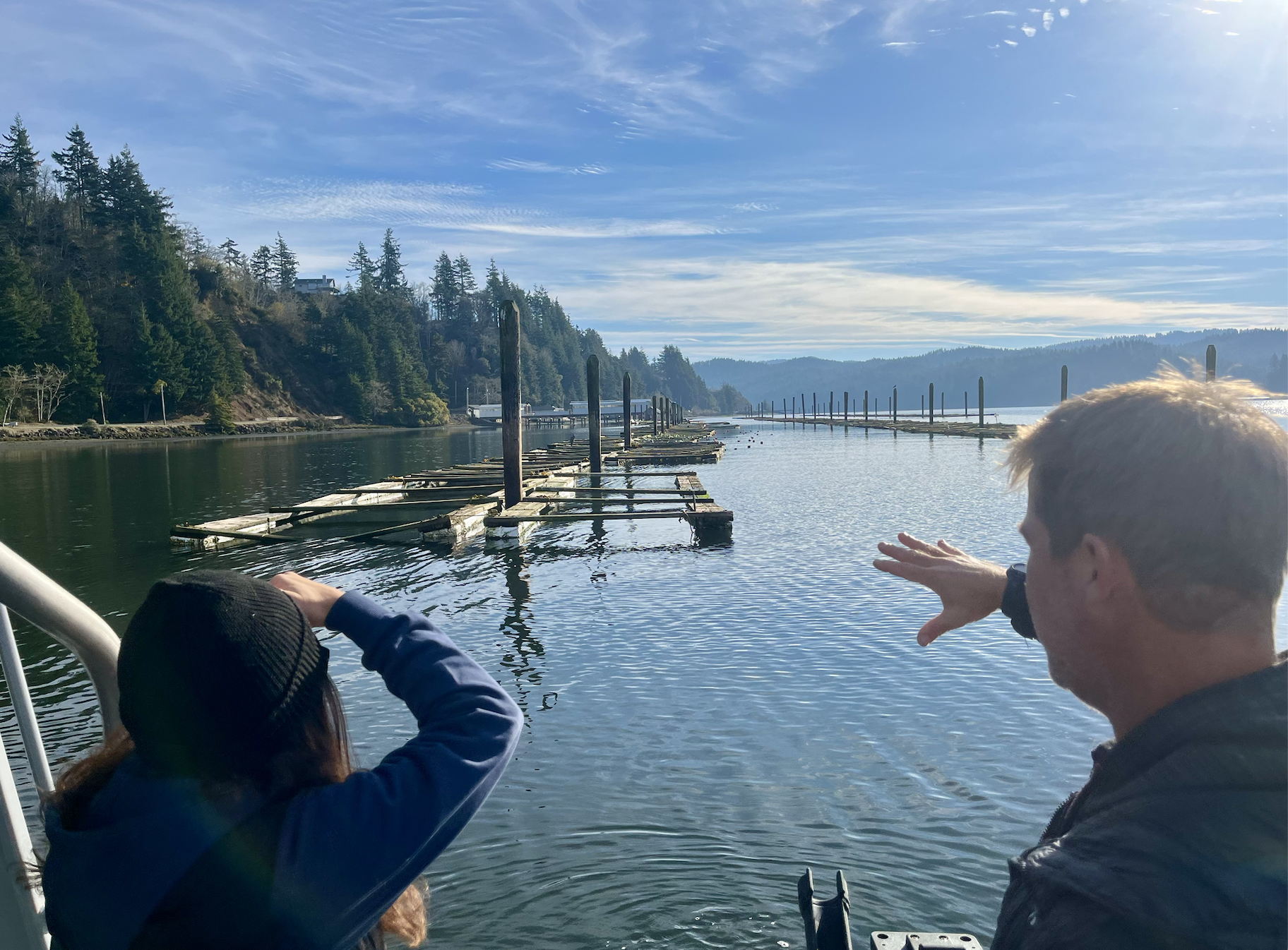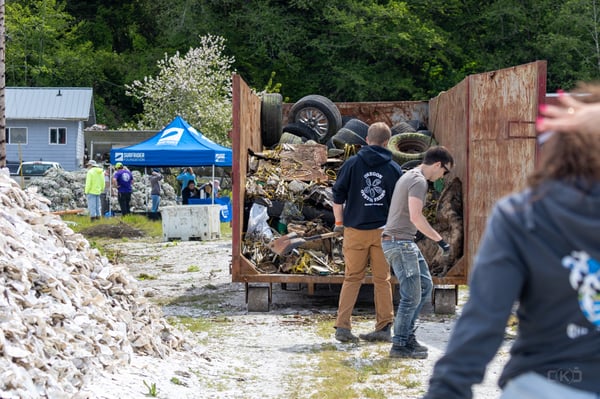
Aquaculture Marine Debris Reduction Project
A collaborative initiative with the Oregon Sea Grant Natural Resource Policy Fellowship.
The Problem
Oyster aquaculture plays a vital role in Oregon’s coastal economy, but it comes with a challenge: marine debris. Specifically, polystyrene docks and floats used in oyster farming often break down and contribute to plastic pollution in our estuaries. As we work towards more sustainable aquaculture practices, it’s essential to address this issue and find effective solutions to reduce marine debris and protect our waterways.

1 Volunteers from the Newport Chapter at a cleanup event targeting aquaculture marine debris in 2021. Photo credit: Charles Mitchell

2 Polystyrene dock fragments in Yaquina Bay show biofouling and harbor an invasive isopod species that bores into the foam, posing an added problem for the area. Photo: Charles Mitchell

3 Polystyrene breaks down into tiny particles that spread throughout the estuary, making cleanup tough and creating a lasting risk for wildlife that can accidentally consume the fragments. Photo credit: Charles Mitchell

4 Large piece of foam from an aquaculture dock with yellow rope attached, recovered in Yaquina Bay. Over time, these docks break down and contribute debris that can harm estuary ecosystems. Photo credit: Charles Mitchell

5 Surfrider volunteer carries a sizable piece of plastic debris from the Yaquina Bay cleanup. The large size of these foam fragments poses significant logistical challenges for removal and disposal. Photo credit: Charles Mitchell
From Dock to Debris
How expanded polystyrene (EPS) pollutes the aquatic environment

Upcoming Events
.png)
Yaquina Bay Community Cleanup Partnership
Our Newport Chapter has teamed up with Oregon Oyster Farms, the MidCoast Watersheds Council, Lincoln County Solid Waste District for a series of collaborative cleanups aimed at tackling marine debris from aquaculture operations in Yaquina Bay. These events are part of an ongoing effort to remove legacy dock materials—particularly polystyrene foam—and support the transition to more sustainable practices in the bay.
Together, we're restoring shorelines, supporting local oyster farmers in their sustainability journey, and building a cleaner, healthier future for Yaquina Bay.
Volunteer with Us!
We need your help! Join us for one (or both!) of our upcoming community cleanups. These are hands-on, rewarding days open to all, with food, fun, and a chance to connect with others who care about our beaches & bays.
Follow along behind the scenes of this project on Instagram!
.png)
Poole Slough Sweep
When: May 3rd from 10AM - 1PM
Where: South Bay property of Oregon Oyster Farms in Toledo (directions shared with registrants)
Who: Partnership with Surfrider Foundation, Oregon Oyster Farms, Lincoln County, MidCoast Watersheds Council, Dahl Disposal
Why:
Help remove years of accumulated aquaculture debris from Poole Slough at the southern end of Yaquina Bay. Learn about the farm’s efforts to reduce plastic pollution and transition to more sustainable materials.
Light refreshments provided at arrival and BBQ oysters to follow!
.png)
Foam Fighters Cleanup
When: May 17th from 10AM - 12PM
Where: Half Way Park on Bay Road
Who: Partnership with Surfrider Foundation, Oregon Oyster Farms, Lincoln County, Thompson's Sanitary Service
Why:
Join us to remove polystyrene foam from old floating aquaculture docks that have broken apart over the years. This foam fragments into microplastics and pollutes local habitats—your help makes a real difference! Light refreshments provided.

Download our one-pager
Get an overview of the Aquaculture Marine Debris Reduction Project and its efforts to address polystyrene foam pollution.
This one-pager highlights the project's goals, current initiatives, and the challenges of reducing foam waste in Oregon.
Lessons From Up North
Canada's Foam Free Solutions
In Oregon, floating foam docks must be encapsulated to prevent pollution, though enforcement has been inconsistent, and some farms still use non-compliant docks.
Canada, on the other hand, does not have a requirement for foam encapsulation but is actively working toward banning both encapsulated and unencapsulated foam in aquatic environments.
Alongside advocating for a ban, Canada has partnered with government funding agencies to assist in retrofitting foam docks, replacing them with more sustainable materials. This proactive strategy combines regulatory measures with financial incentives, fostering widespread change through collaboration and community-driven efforts for a better Canadian coastline.
Learn more in their recently released short film!


.png)



